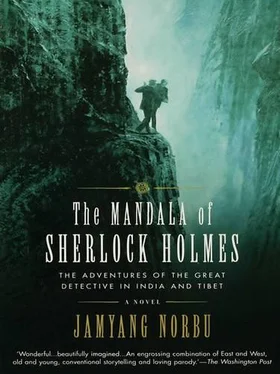Kintup and I travelled to nearby Narkhanda for the animal mela, or fair, where we purchased twelve sturdy mules to carry our baggage and provisions. For riding we purchased five shaggy little tats, or hill ponies, which in spite of their ludicrous size and hirsuteness, were stronger and better equipped to survive in the desolate highlands of Thibet than most horses.
I also had to arrange for the purchase or preparation of various other items: tents, saddles, pack-saddles and panniers, yakdans, which are small leather-covered wooden boxes such as are used in Turkestan, kitchen utensils and dekchis frieze blankets, gutta-percha undersheets, a tent-bed for Mr Holmes, bashliks, rifles, knives, note-books, writing material, talkan, or roasted barley meal, which the Thibetans call tsampa, preserved meat, tobacco, etcetera, etcetera. I instructed Jamspel to bake a large quantity of khura, or hard Ladakhi biscuits, which keep practically forever. I was rather partial to them and they were very good to nibble on to relieve the tedium of a long journey.
I managed to order a complete medicine chestfrom Burroughs and Wellcome of London, with drugs prepared specially for a high and cold climate. All the remedies were in convenient tabloids, and stowed in a robust and beautifully crafted wooden chest.
At this point I think that I ought to inform the reader of certain other preparations I made demi-officially in the larger interests of science and Imperial advancement. We fieldmen were not only in the business of collecting political information, as my previous conversation with Colonel Creighton may have led the reader into believing. In fact the bulk of our duties, the rice and daal of departmental activities, was concerned with geographical and ethnological information. Therefore, we fieldmen, or to use the proper Departmental term, chainmen, were trained and equipped essentially to perform such tasks.
Initially we were trained in route survey and reconnaissance work. We were taught the use of sextant and compass, and how to calculate altitudes by observing the boiling point of water. But since this bally business cannot be convenientiy conducted because of the deplorably suspicious and hostile nature of the ignorant inhabitants of unexplored lands – and since it is occasionally inexpedient to carry measuring chains and other conspicuous tools of the trade – the Department has devised some very ingenious methods and contrivances to circumvent suspicion and hostility.
First of all we were trained to take, by much practice, a pace which, whether we walked up mountains, down valleys, or on level ground, always remained the same – thirty inches in my case. We also learned how to keep an exact count of the number of such paces we took in a day, or between any two landmarks. This was done with the aid of a Buddhist rosary, which you may know comprises one hundred and eight beads. Eight of these were removed, leaving a mathematically convenient one hundred, but not a sufficient reduction to be noticeable. At every hundredth pace a bead was slipped. Each complete circuit of the rosary therefore represented ten thousand paces – five miles in my case, as I covered a mile in two thousand paces. Because the Buddhist rosary has attached to it two short secondary strings each of ten smaller beads, these were used for recording every completed circuit of the rosary.
Not only was the Buddhist rosary ingeniously adapted to the purpose of exploration, so were prayer-wheels (mani lag-'khor). These were fitted with a secret catch which enabled one to open the copper cylinder and insert or remove the scrolls of paper bearing one's route notes and other intelligence. Compasses were also concealed inside the wheels. Larger instruments like altazimuths and chronometers were concealed in specially-built false bottoms in yakdans while secret pockets were added to our clothing. Thermometers, for measuring altitude, were concealed in hollowed-out staves, and mercury-necessary for setting an artificial horizon when taking sextant readings – was hidden in a secret cowrie shell and poured into a pilgrim's bowl whenever needed.
Lurgan, who had a great facility for deception, had devised most of these contrivances, and had taught us fieldmen how to use them.
11 On the Hindustan-Thibet Road
Ho there, Gaffuru.' The deep booming voice of Kintup was strangely muffled by the dense fog of the early morning. 'Tighten the girth of the bay mule lest he throws his load.'
He finishedchecking the loads on the mules and the trappings on the ponies, and then walked over to me, his thick felt boots softly crunching the gravel on the garden path of Runnymeade Cottage.
'Babuji, thou may'st tell the sahib that all is ready for the journey.'
I stepped into the cottage where Mr Holmes was bidding farewell to old Lurgan. A month earlier, Colonel Creighton had revealed to him the true identity of Sigerson, the Norwegian traveller, and had recruited Lurgan to help in the preparations for the journey. He turned to me as I entered the room.
'Ah, I think old Huree Babu here wants to tell you that everything is ready for your departure, Mr Holmes.' He reached into his coat pocket and pulled out an old tartar pipe, beautifully chased with silver and with a jade stem. 'It is an Eastern custom to offer a gift to the departing traveller. Anyway, I don't see how you could go on smoking that very English cherrywood in your Ladakhi disguise. Please, I insist.'
Mr Holmes accepted the gift and thanked Lurgan warmly. Lurgan turned to me and handed me a cylindrical iron pen case of Thibetan design.
'Seeing that your modern binoculars made the Chinese authorities suspect you on your last trip, I thought it as well that we were more circumspect this time. You just take off the cap and peer through it from the small hole at the bottom and – hey presto! It's a telescope. Is it not clever? I think it is the best thing I've done since the hollow prayer wheel. Well, old chap, best of luck. Do try not to create a diplomatic incident again. It just upsets the Colonel, and you know how difficult he is to work with then.'
We rode silently out of the garden. I turned round in my saddle to see Lurgan's dark outline against the comfortable glow of the open cottage door. He raised his right hand in farewell. I shivered a little, as much because of the penetrating chill of the foggy morning as at the realisation that once more I was leaving comfort and security to face the hardships and perils of the unknown. As I have confessed before, I am an awfully fearful sort of man -which is a serious detriment in my profession – but somehow or the other, the more fearful I become, the more dam' tight places I get into.
Yet fear at least performs the useful function of making one careful. I had taken a number of precautions to ensure that anyone taking undue interest in our activities would not learn very much. Even our silent, stealthy departure on this dark morning was one of my attempts to 'muddy the well of inquiry with the stick of precaution,' as they would say in Afghanistan.
Our small khafila wended its way out of Chota Simla on to the Hindustan-Thibet Road, planned and commenced in 1850 by Major Kennedy, secretary to Sir Charles Napier who completed the conquest of the Punjab and Sind. This redoubtable feat of Imperial road building majestically traverses the lofty barriers of the high Himalayas for two hundred and three miles to end at Shipki la on the Thibetan frontier.
Gradually the darkness was dispelled, though the clammy mist clung cheerlessly to the cold mountainside. The indistinct shapes of our animals and riders merged like wet inkstains with the dark outiines of trees and bushes, while the muffled clip-clop of shod hooves, the creak of strained leather, the steady breathing and occasional snorts of our patient beasts filtered so faintly through the mist that they seemed like sounds from some half-forgotten dream.
Читать дальше












